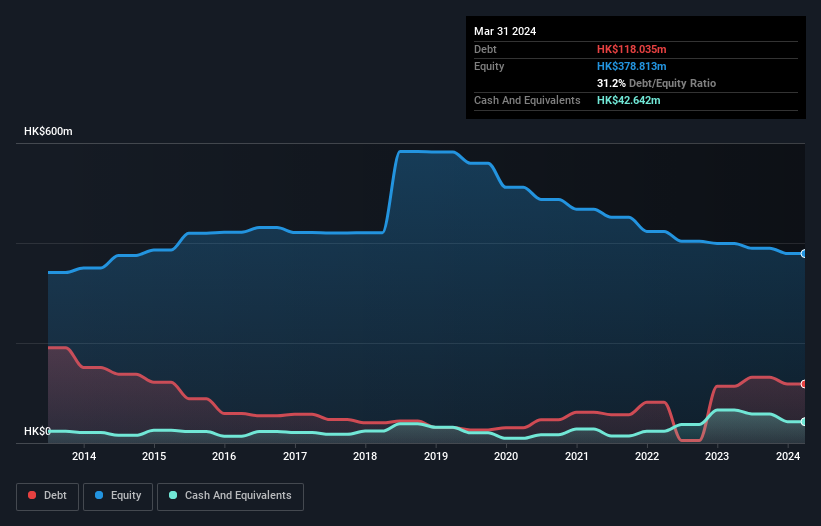
The external fund manager backed by Berkshire Hathaway's Charlie Munger, Li Lu, makes no bones about it when he says 'The biggest investment risk is not the volatility of prices, but whether you will suffer a permanent loss of capital.' When we think about how risky a company is, we always like to look at its use of debt, since debt overload can lead to ruin. We can see that Mexan Limited (HKG:22) does use debt in its business. But should shareholders be worried about its use of debt?
When Is Debt Dangerous?
Generally speaking, debt only becomes a real problem when a company can't easily pay it off, either by raising capital or with its own cash flow. Part and parcel of capitalism is the process of 'creative destruction' where failed businesses are mercilessly liquidated by their bankers. However, a more usual (but still expensive) situation is where a company must dilute shareholders at a cheap share price simply to get debt under control. Having said that, the most common situation is where a company manages its debt reasonably well - and to its own advantage. When we think about a company's use of debt, we first look at cash and debt together.
View our latest analysis for Mexan
How Much Debt Does Mexan Carry?
The image below, which you can click on for greater detail, shows that at March 2024 Mexan had debt of HK$118.0m, up from HK$113.4m in one year. On the flip side, it has HK$42.6m in cash leading to net debt of about HK$75.4m.

How Healthy Is Mexan's Balance Sheet?
Zooming in on the latest balance sheet data, we can see that Mexan had liabilities of HK$95.6m due within 12 months and liabilities of HK$80.8m due beyond that. Offsetting this, it had HK$42.6m in cash and HK$45.6m in receivables that were due within 12 months. So its liabilities outweigh the sum of its cash and (near-term) receivables by HK$88.2m.
This is a mountain of leverage relative to its market capitalization of HK$108.2m. Should its lenders demand that it shore up the balance sheet, shareholders would likely face severe dilution. The balance sheet is clearly the area to focus on when you are analysing debt. But it is Mexan's earnings that will influence how the balance sheet holds up in the future. So when considering debt, it's definitely worth looking at the earnings trend. Click here for an interactive snapshot.
In the last year Mexan wasn't profitable at an EBIT level, but managed to grow its revenue by 40%, to HK$177m. With any luck the company will be able to grow its way to profitability.
Caveat Emptor
Despite the top line growth, Mexan still had an earnings before interest and tax (EBIT) loss over the last year. To be specific the EBIT loss came in at HK$8.3m. Considering that alongside the liabilities mentioned above does not give us much confidence that company should be using so much debt. So we think its balance sheet is a little strained, though not beyond repair. However, it doesn't help that it burned through HK$1.7m of cash over the last year. So suffice it to say we do consider the stock to be risky. There's no doubt that we learn most about debt from the balance sheet. However, not all investment risk resides within the balance sheet - far from it. These risks can be hard to spot. Every company has them, and we've spotted 1 warning sign for Mexan you should know about.
When all is said and done, sometimes its easier to focus on companies that don't even need debt. Readers can access a list of growth stocks with zero net debt 100% free, right now.
New: Manage All Your Stock Portfolios in One Place
We've created the ultimate portfolio companion for stock investors, and it's free.
• Connect an unlimited number of Portfolios and see your total in one currency
• Be alerted to new Warning Signs or Risks via email or mobile
• Track the Fair Value of your stocks
Have feedback on this article? Concerned about the content? Get in touch with us directly. Alternatively, email editorial-team (at) simplywallst.com.
This article by Simply Wall St is general in nature. We provide commentary based on historical data and analyst forecasts only using an unbiased methodology and our articles are not intended to be financial advice. It does not constitute a recommendation to buy or sell any stock, and does not take account of your objectives, or your financial situation. We aim to bring you long-term focused analysis driven by fundamental data. Note that our analysis may not factor in the latest price-sensitive company announcements or qualitative material. Simply Wall St has no position in any stocks mentioned.
Have feedback on this article? Concerned about the content? Get in touch with us directly. Alternatively, email editorial-team@simplywallst.com
About SEHK:22
Mexan
An investment holding company, supplies building materials and furniture in Hong Kong and Macau.
Adequate balance sheet and slightly overvalued.
Market Insights
Community Narratives


